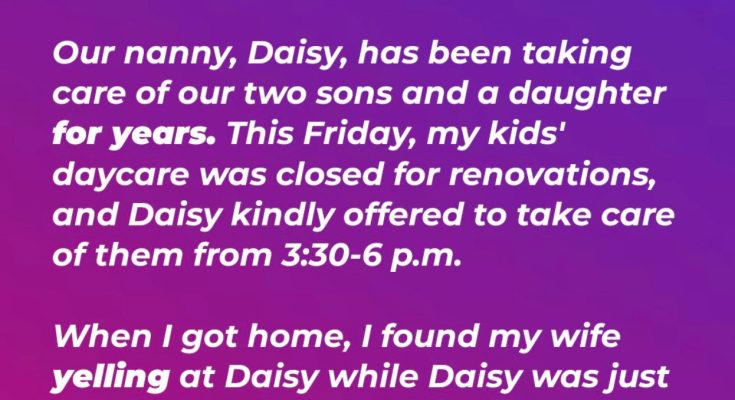
When our trusted teenage babysitter made a mistake, my wife fired her on the spot, leaving our household in chaos. Now, I’m questioning whether I was wrong for calling out my wife—and if this conflict is about more than just one decision.
Friday started like any other day in our household. With daycare closed for renovations, we turned to Daisy, our 16-year-old babysitter, for help. Daisy isn’t just someone we call in when we’re stuck.
She’s practically family. She’s been part of our lives for years, starting as a helper alongside her mom when my oldest was a baby. Now, she’s fully in charge when we need her, managing our three kids on her own with a confidence that makes her seem older than her years.
Daisy has always been a natural with the kids. My 8-year-old son and 6-year-old daughter light up when she walks through the door, running to show her their latest toys or ask her to join a game.
Even our 7-month-old, who’s usually fussy with new people, settled into Daisy’s care without much trouble. To us, Daisy is a dependable, trustworthy, and loving integral part of our chaotic, busy household.
My wife and I both have demanding jobs. Most days, we’re out the door early, juggling meetings and deadlines while coordinating pickups, drop-offs, and the general whirlwind that comes with three kids.
This Friday wasn’t supposed to be any different. My mom agreed to help in the morning, staying with the kids until Daisy could take over at 3:30. From there, Daisy would handle things until I got home around 6.
It felt like a perfect plan.
Our house is typical of a family with young kids—lived-in and bursting with activity. The living room is the center of it all.
Toys are scattered across the rug, and the couch cushions are often rearranged into elaborate forts. The dining room doubles as a craft zone, with art supplies perpetually spread across the table. It’s messy, sure, but it’s home.
On most days, when I walk through the door, I’m greeted by the sound of laughter, the hum of cartoons, or the kind of chaos that makes a house feel alive. But not this time.
When I came home at 5:30, everything felt… off. The usual buzz of activity was gone, replaced by something heavier. The first thing I heard was my wife’s voice, sharp and angry. It wasn’t the normal, exasperated tone that comes with dealing with spilled juice or a forgotten chore. This was different.
I dropped my bag by the door, my pulse quickening as I followed the sound of her voice. By the time I reached the living room, I was met with a scene that made me stop in my tracks.
Daisy stood near the couch, clutching her phone like it was the only thing holding her together. Tears streamed down her face, and she looked terrified. My wife was pacing back and forth, her arms crossed tightly over her chest, her face red with anger.
“What is going on?” I asked, stepping into the room.
“She called 911!” my wife snapped, throwing her hands into the air.
“What?” I looked at Daisy, stunned. She was shaking so hard I thought she might drop her phone.
“I—I…” Daisy stammered, unable to get the words out.
“She panicked and made a ridiculous decision!” my wife cut in, her voice rising. “Hundreds of dollars, wasted!”
Daisy’s lips quivered, her tears falling faster. Whatever had happened, it was clear she was overwhelmed.
“Can someone please explain what’s going on?” I said again, looking between them.
Daisy tried to speak, but her voice cracked, and she wiped at her face with trembling hands.
“He… he didn’t breathe and went limp,” she managed to say. “I didn’t know what to do!”
It wasn’t like Daisy to lose her composure. Whatever had happened, it was enough to leave her visibly shaken. The tension in the room was almost suffocating, and I wasn’t sure what to say. This wasn’t how I imagined coming home. Not at all.
The aftermath of the incident with Daisy sparked a firestorm in our home. My wife’s anger didn’t simmer down once Daisy left. Instead, it boiled over into a full-blown argument between the two of us that only widened the gap between us.
“She had no right to call 911 without contacting me first,” my wife said, pacing back and forth in the living room, her arms crossed tightly. “We’re the parents. She’s just a babysitter. If she couldn’t handle it, she should’ve called us, not panicked and called for an ambulance!”
“She thought the baby wasn’t breathing,” I countered, trying to keep my voice steady.
“She thought,” my wife repeated, her tone biting. “But she didn’t know. This is exactly why I expect people we hire to stay calm under pressure. She’s been babysitting for years—she’s not some rookie who doesn’t know how to handle kids crying or getting upset!”
“Crying is one thing,” I said, gesturing toward the baby’s room, where he now slept peacefully. “But turning blue and limp? She thought he was in serious danger.”
“And what about the cost, huh?” she snapped, turning to face me. “You know how much an ambulance ride costs? Hundreds of dollars for something that wasn’t even an emergency! Do you think Daisy’s parents are going to pay for that? No. That’s coming out of our pocket.”
“It’s money,” I said, exasperated. “What matters is that she was trying to protect him.”
My wife let out a bitter laugh. “Oh, of course. You’re defending her. Again. You always side with her. What about me? What about what I think?”
“This isn’t about taking sides,” I said firmly. “It’s about what’s right.”
“What’s right,” she said, her voice rising, “is that we hired her to take care of the kids, not to create unnecessary problems. And you know what? The kids heard everything. They saw me yelling. They saw Daisy crying. Do you think that’s fair to them?”
As my wife’s words sank in, I felt torn. I understood her frustration—the cost of the ambulance was steep, and the situation could have been handled better. But her explosive reaction in front of the kids and her immediate dismissal of Daisy felt wrong to me.
“You’re right about the kids,” I said, trying to find common ground. “But yelling at Daisy in front of them didn’t help. They were scared too. And what about Daisy? She was crying, and you wouldn’t let her explain herself.”
“She didn’t need to explain herself,” my wife said coldly. “She panicked and made a bad decision. That’s all there is to it.”
“She’s 16,” I said, my voice softening. “And she didn’t know what to do. Instead of freezing up, she took action. Isn’t that better than doing nothing?”
“Not if it costs us hundreds of dollars!” my wife shot back. “And you defending her only makes me feel like you don’t care how I feel about this.”
“This isn’t about choosing Daisy over you,” I said, running a hand through my hair. “It’s about acknowledging that she made a tough call in a stressful moment. Do you know how much courage it took for her to pick up the phone and call 911? Most teenagers would’ve frozen.”
“She’s not most teenagers,” my wife said, shaking her head. “We’ve trusted her for years. She should’ve known better.”
Her words stung. I couldn’t understand how we’d reached this point. How a single event had unraveled years of trust, not just with Daisy but between us as a couple.
Later that evening, after the kids were asleep, I found my wife sitting on the couch, staring at her hands. The anger had faded from her face, replaced by exhaustion. I sat down beside her, hesitant but determined to bridge the gap between us.
“I’ve been thinking,” I began. “You’re right about a lot of things. This wasn’t handled perfectly, and the cost of the ambulance is frustrating. But I also think Daisy was just trying to do her best in a situation she didn’t understand.”
She let out a sigh. “I know. I keep replaying it in my head, and I hate that I yelled. I just… I felt so out of control, and the money… it’s not easy to brush off.”
“I get that,” I said softly. “But we didn’t give her the tools to handle this. If she’d known what to do, none of this would’ve happened. That’s on us, not her.”
My wife nodded slowly. “I guess I was expecting her to know everything without us telling her. That’s not fair to her.”
“We’ve trusted her for years,” I said. “One mistake doesn’t undo that.”
She leaned into me, resting her head on my shoulder. “Let’s talk to Daisy. Apologize. Make it right.”
“Together,” I agreed. And for the first time all day, it felt like we were on the same team again.



